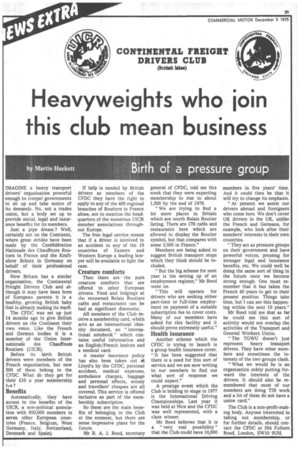Heavyweights who join this club mean business
Page 33

If you've noticed an error in this article please click here to report it so we can fix it.
by Martin Huckett
IMAGINE a heavy transport drivers' organisation powerful enough to compel governments to sit up and take notice of its demands. No, not a trades union, but a body set up to provide social, legal and insurance benefits for its members.
Just a pipe dream ? Well, certainly not on the Continent, where great strides have been made by the Confederation Nationale des Chauffeurs Routiers in France and the Kraftahrer Schutz in Germany on behalf of their professional drivers.
Now Britain has a similar organisation, the Continental Freight Drivers Club and although it may have been born of European parents it is a healthy, growing British baby that is already making its mark, The CFDC was set up just 14 months ago to give British drivers on the Continent their own voice. Like the French and German bodies it is a member, of the Union Internationale des Chauffeurs Routiers (UICR).
Before its birth British drivers were members of the French organisation, but now 500 of them belong to the CFDC. What do they get for their £10 a year membership tee?
Benefits
Automatically, they have access to the benefits of the UICR, a non-political association with 600,000 members in seven other European countries (France, Belgium, West Germany, Italy, Switzerland, Denmark and Spain). If help is needed by British drivers as members of the CFDC they have the right to apply to any of the 400 regional branches of Routiers in France alone, not to mention the headquarters of the numerous UICR member associations throughout Europe.
The free legal service means that if a driver is involved in an accident in any of the 19 countries of Eastern and Western Europe a leading lawyer will be available to fight the case.
Creature comforts
Then there are the pure creature comforts that are offered to qther European drivers. Food and lodgings at the renowned Relais Routiers cafés and restaurants can be had at significant discounts.; All members of the Club receive a membership card, whiCh acts •as an international identity document, an "international notebook" which contains useful information and an English/French lexicon and a medical card.
A master insurance policy has also been taken out at Lloyd's by the CFDC, personal accident, medical expenses, ambulance charges, baggage and personal effects, money and travellers' cheques are all covered. This service is offered inclusive as part of the membership subscription.
So these are the main benefits of belonging to the Club at the moment, but there are some impressive plans for the future.
Mr R. A. J. Reed, secretary general of CFDC, told me this week that they were expecting membership to rise to about 1,500 by the end of 1976.
"We are trying to find a lot more places in Britain which are worth Relais Routier listing. There are 170 cafes and restaurants here which are allowed to display the Routier symbol, but that compares with some 3,500 in France."
Members are being asked to suggest British transport stops which they think should be included.
" But the big scheme for next year is the setting up of an employment register," Mr Reed went on.
"This will operate for drivers who are seeking either part-time or full-time employment on payment of a suitable subscription fee to cover costs. Many of our members have asked for this facility and it should prove extremely useful."
Health insurance
Another scheme which the CFDC is trying to launch is a group health insurance cover. "It has been suggested that there is a need for this sort of service and we are now writing to our members to find out what sort of response we could expect."
A prestige event which the Club is bidding to stage in 1977 is the International Driving Championships. Last year it was held at Nice and the CFDC was well represented, with a class winner.
Mr Reed believes that it is a "very real possibility" that the Club could have 10,000 members in five years' time. And it could then be that it will try to change its emphasis.
"At present we assist our drivers abroad and foreigners who come here. We don't cover UK drivers in the UK, unlike the French and Germans, for example, who look after their members' interests in their own countries.
"They act as pressure groups on their government and have powerful voices, pressing for stronger legal and insurance benefits, etc. We could well be doing the same sort of thing in the future once we become strong enough. One must remember that it has taken the French 40 years to get to their present position. Things take time, but I can see this happening within the next 10 years."
Mr Reed told me that as far he could see this sort of activity would not overlap the activities of the Transport and General Workers Union.
"The TGWU doesn't just represent heavy transport drivers. They have other members and sometimes the interests of the two groups clash.
"What we would be is an organisation solely putting forward the interests of the drivers. It should also be remembered that most of our members are doing TIR work and a lot of them do not have a union card."
The Club is a non-profit-making body. Anyone interested in taking out membership, or for further details, should contact the CFDC at 354 Fulham Road, London, SW10 9UH.


































































































































